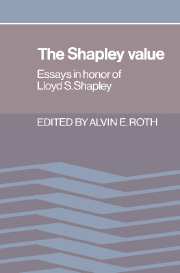Book contents
- Frontmatter
- Contents
- Preface
- 1 Introduction to the Shapley value
- I Ancestral papers
- II Reformulations and generalizations
- III Coalitions
- IV Large games
- 13 Values of large finite games
- 14 Payoffs in nonatomic economies: an axiomatic approach
- 15 Values of smooth nonatomic games: the method of multilinear approximation
- 16 Nondifferentiable TU markets: the value
- V Cost allocation and fair division
- VI NTU games
14 - Payoffs in nonatomic economies: an axiomatic approach
Published online by Cambridge University Press: 13 October 2009
- Frontmatter
- Contents
- Preface
- 1 Introduction to the Shapley value
- I Ancestral papers
- II Reformulations and generalizations
- III Coalitions
- IV Large games
- 13 Values of large finite games
- 14 Payoffs in nonatomic economies: an axiomatic approach
- 15 Values of smooth nonatomic games: the method of multilinear approximation
- 16 Nondifferentiable TU markets: the value
- V Cost allocation and fair division
- VI NTU games
Summary
Introduction
It has been much remarked that different solutions become equivalent in the setting of economies in which there is “perfect competition”; that is, no individual can affect the overall outcome. The conjecture that the core coincides with competitive (Walras) allocations was made as far back as 1881 by Edgeworth [11]. His insight has been confirmed in increasing generality in a series of papers [20,9,2,14,13,7,8,1] over the last three decades. Another line of inquiry originated with the recent introduction of a value for games by Shapley [17]. It was found that this also coincided with the above two [19,6,3].
The equivalence phenomenon is striking in view of the fact that these solutions are posited on entirely different grounds. If we restrict ourselves to smooth, transferable utilities, then the result is even sharper: not only do the solutions coincide, but they are also unique (i.e., consist of a single payoff). Our aim here is to give another view of this “coincident payoff” by putting it on an axiomatic foundation. As an upshot of our approach, we get a “metaequivalence” theorem, by way of a categorization: Any solution coincides with this payoff if and only if it satisfies our axioms.
The transferable utility assumption is undoubtedly restrictive.
- Type
- Chapter
- Information
- The Shapley ValueEssays in Honor of Lloyd S. Shapley, pp. 207 - 216Publisher: Cambridge University PressPrint publication year: 1988



